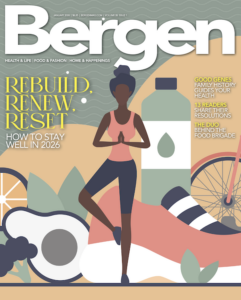Our Happy Home?
Statistics suggest that the road to contentment just may run through Bergen County.

Can a place confer happiness? We don’t mean a getaway spot, like Disney World or the south of France, but the more permanent place—the county, let’s say—that one calls home. According to two annual “happiness” reports, where you live is indeed both an indicator of and a contributor to your sense of contentment and well-being.
For residents of Bergen County, those reports, which rank geographic locations based on factors believed to contribute to long-term happiness, deliver a mixed message this year: For the first time since the World Happiness Report (WHR) was initially published by the United Nations in 2012, the U.S. fell off the list of the top-20 happiest countries, behind, among others, Lithuania (19), Canada (15), Kuwait (13), Switzerland (9), Iceland (3), Denmark (2) and Finland (1). On the other hand, according to the Happiest States in America, published by the financial website WalletHub, New Jersey scores high on the happiness scale—landing in fifth place in the latest report, after Minnesota (4), Maryland (3), Hawaii (2) and Utah (1). (The report compared states according to three key dimensions: emotional and physical well-being, work environment and community enrichment, considering things like life expectancy, physical health, economic security and commute time.) We wondered, then, whether Bergen County might equal or even exceed its home state’s average in giving its residents a lasting sense of happiness, and we’re happy to say that seems to be the case. Based on metrics used by both reports, as well as those provided by professionals working in the realm of human well-being, Bergen appears to be an excellent place to live if one of your goals in life is to be happy.
WHAT DOES IT MEAN TO BE HAPPY?
When Mina Ahn, Ph.D., a psychology professor at Bergen Community College, asked her students to define happiness, the responses were anything but uniform. “Happiness, to me, is becoming financially stable and having a family of my own,” one student wrote. Other answers included “self-love,” “playing soccer and taking care of my family” and “a combination of being part of a community with good people and also achieving individual goals.” One student found happiness elusive on the basics. “You cannot truly be happy if you spend two-thirds of your life at work, just trying to make a living,” he wrote.
Clearly, what makes us happy is as individual as we are. But for the purposes of gauging the overall happiness of a population, “life satisfaction” is a good summary of what the surveys are measuring—and what most of us are chasing. Some of the metrics used in both reports— wealth, for instance—indicate that a place’s residents are happy. Yes, on average, Bergenites are wealthier than residents of most other U.S. counties, and yes, research indicates that wealth can make us happy. But living in Bergen doesn’t necessarily make you wealthy; rather, if you have money, you can afford to live here and take advantage of other things that actually do contribute to happiness, like ample access to green spaces. None of this means living in the county guarantees you happiness. But residency here might just afford you an easier ascent to that universally desired state of mind.
Income. The oft-repeated adage “Money can’t buy happiness” may be balm to those of us who don’t have much of the former, but according to recent research, it may just represent wishful thinking. A 2010 study by a pair of Nobel Prize-winning economists, for instance, showed that money could indeed increase happiness, up to a cap of $75,000 in annual earnings; beyond that, however, income didn’t seem to have much additional effect. Explaining why money and happiness may be intertwined, Eileen Klein, Ph.D., a professor of social work at Ramapo College, says: “I think we need to attain some basics to feel good. Once we get our immediate needs satisfied, we then have enough energy and time to start working toward sustaining happiness.”
But a more recent study by one of those two Nobelists concluded that more money—beyond what we need to feel relatively comfortable—may, in fact, lead to greater happiness, up to a cap of $500,000 in annual earnings. The connection between green and serene is probably more nuanced: A recent study out of Harvard University found that people who prioritized time over money tended to be happier than those who were motivated by money alone. In any case, WHR lists income as one of its important metrics. And if wealth is an indicator of happiness, Bergen is smiling. With an average household income of $104,623, it ranks 33rd among the nation’s 3,142 counties.
Life and death. Like income, life expectancy is another metric used in WHR (it’s also given double weight in the Happiest States report). While a long life may not afford you happiness, it’s a sign that you possess some of those basics on which happiness can be built, such as good health and a safe environment. In fact, a 2010 study from the University of Illinois found that, simply put, happy people live longer. Bergen residents can, on the whole, expect to live long (and yes, prosper), with a median life expectancy of 83.2 years. For comparison, New Jersey’s life expectancy is 80.5 years, versus the national average of 77.5. Another positive indicator of happiness is the county’s very low suicide rate—a metric that’s given triple weight in Happiest States: 1 per 100,000 people, as opposed to 7.8 for New Jersey and 13.9 for the U.S.
WHAT MAKES US HAPPY?
If the idea that money can buy happiness depresses you, you may be cheered by the fact that Bergen County offers its residents plenty of other things that contribute to life satisfaction—and some of them are even free. Access to healthcare. On the U.S. News and World Report’s list of healthiest communities, published in 2022, Bergen scored 78 out of a possible 100 points, while New Jersey as a whole came in considerably lower, at 59. One of the reasons for our high score is residents’ easy access to quality healthcare. In fact, according to U.S. News and World Report, two of the best hospitals in the state are located in Bergen: Hackensack University Medical Center (No. 1) and The Valley Hospital in Paramus (3). In addition, Englewood Health was rated as high performing in a number of areas, including cardiac care, and Holy Name Medical Center in Teaneck was rated high performing in, among other things, ICU care. Our good hospital grades help to explain why the percentage of Bergen’s adults in poor or fair general health is relatively low: 13.9 percent as opposed to 15.5 percent in New Jersey as a whole and 19.5 percent across the U.S.
Additionally, notes Magdalena Spariosu, M.D., director of behavioral health at Englewood Health, “there’s a wealth of mental health resources in the area. And access to a variety of mental health modalities, professionals and programs makes it that much easier for individuals to find support when they need it.”
Bergenites are also well insured. Only 8.4 percent of us lack health insurance, as opposed to 9.3 percent of New Jerseyans and 11 percent of Americans as a whole.
Social support. It’s hard to understate the importance of social support—in the form of strong interpersonal relationships—to human happiness. “Almost all psychologists consider positive relationships to be crucial to well-being and satisfaction,” says Ahn. “And strong social ties have been linked to better physical and mental health.” Those relationships are particularly in evidence among Bergen’s tight-knit Asian communities, which represent 17.6 percent of the county’s population.
Bergen County also fosters community connection through its physical layout. When a recent Knight/Gallup survey asked people what traits happy communities share, one of the most common responses was places where neighbors can encounter each other spontaneously, such as parks, community centers and restaurants, along with community events such as celebrations and festivals—all of which Bergen has in profusion.
Overall, says Dr. Spariosu, “Bergen County has a strong sense of community, and living in communities where families and individuals feel supported and connected to each other can certainly contribute to overall happiness.”
Safety. Among the basics we need to be happy, says Klein, “is living in a safe place,” and safety is also a metric in Happiest States. While Bergen only ranks sixth for safety out of New Jersey’s 21 counties, our crime rates would be enviable to most of the rest of the U.S. According to the FBI, Bergen’s violent crime rate is 8.6 per 1,000 residents compared with the national rate of 22.7, and our property crime rate is 19 versus 35.4.
Generosity. “Making someone else feel good helps you feel better,” says Klein. And generosity, indeed, is one of the major metrics of WHR. Bergenites appear to be happy to give: The personal financial company SmartAsset ranked New Jersey counties according to annual charitable giving, and Bergen County was fifth among the state’s 21 counties. (Of course, it’s easier to donate if one has wealth to spare.)
Positive effect: That’s WHR’s combined metric for what it describes as “laugh, enjoyment and doing interesting things.” While we couldn’t find statistics on how often Bergenites laughed, the county is rich in what Klein calls “the opportunity for diverse experiences.” “There’s a lot going on, pretty close to home,” she says, citing “places to eat, all different sorts of food to experience, cultural events, varied physical environments—waterfalls, parks, hiking trails, public gardens, different ethnic neighborhoods.” In fact, many of those varied environments, says Ahn, help Bergenites lead healthier lives, “and physical health,” she notes, “is strongly linked with mental and emotional health.”
Of course, no one is happy all the time, and many of us have mental health conditions, like anxiety and depression, that keep happiness at bay. Bergen’s abundance of mental health professionals are ready to help you find the greater satisfaction in life you’d like to achieve. If you’d just like to be happier, take your cue from the happiness reports: Help others, cultivate a healthy lifestyle, nurture positive relationships (you don’t need hundreds, says Ahn—one really good one helps a lot) and enjoy all the environmental and cultural riches that living in a happy county like Bergen bestows.

